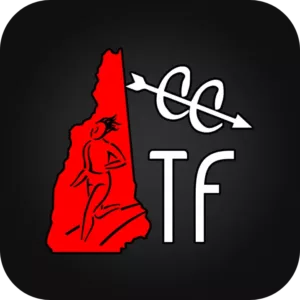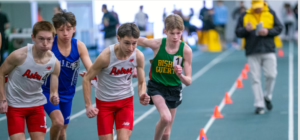Below is what we can hope can be a little bit of a distraction from the current COVID-19 crisis. Thoughts on training. Another great contribution from John Goegel, our friends at NHTFCA, and Jeff Johnson. Enjoy!
Jeff Johnson, Nike’s Employee #1 and an innovative/accomplished coach, is an insightful observer (written and photographic form) of our great sport. Jeff coached the “NIKE Farm Team”, located at Stanford University (his alma mater), from October 1994 through the 2000 Olympic T&F Trials (July). Being a prolific note taker and communicator, his communiques with his Farm Team athletes are noteworthy. Regarding those letters, Chris Lear, a former Farm Team member and author of Running With The Buffaloes, said, “I hope you have the letters he used to write – amazing stuff.” “Amazing” is an apt description.
Attached is one that Jeff recently dug out of his archives. It is addressed to Ray Appenheimer – former Farm Team member turned F.T. assistant coach and now Oberlin Head XC and T&F Coach. As Jeff said in his typical low key manner, “Some things of possible interest here.”
Jeff’s other Farm Team letters and some of his articles can be found at nhtfca.org.
~ John Goegel
Appenheimer Letter
Epilogue to the Appenheimer Letter (January 5, 2020)
 Instead or having reached an “amazing” performance level with an athlete, then keeping him “in the zone” rather than continue to pour on hard work, the Patrick Shane solution might be the best one: start your training season late. If a coach anticipates before the season that his champions may have a 9-10 week racing season (say, from Sept. to NIKE Team Nats or Foot Locker) those athletes should probably not race and continue with base work until the first of October. Let your JVs carry the ball in September and into October. Your champions may open at the Division Meet as their first race. I know, I know, how do you justify running kids in the Div. Meet who haven’t raced yet? Presumably, October workouts have demonstrated their fitness…or let them run a Conference Championship, if you have one. This is a very “professional” approach, and the whole team has to be on board with it.
Instead or having reached an “amazing” performance level with an athlete, then keeping him “in the zone” rather than continue to pour on hard work, the Patrick Shane solution might be the best one: start your training season late. If a coach anticipates before the season that his champions may have a 9-10 week racing season (say, from Sept. to NIKE Team Nats or Foot Locker) those athletes should probably not race and continue with base work until the first of October. Let your JVs carry the ball in September and into October. Your champions may open at the Division Meet as their first race. I know, I know, how do you justify running kids in the Div. Meet who haven’t raced yet? Presumably, October workouts have demonstrated their fitness…or let them run a Conference Championship, if you have one. This is a very “professional” approach, and the whole team has to be on board with it.
At the highest levels of USATF track, it is not uncommon for an athlete to open at the USATF Championship (first week of July) and peak at the Diamond League meets of September.
John McDonald, at Arkansas, used to put his athletes immediately back into base training after the NCAA Indoor Championships in the first week of March and then have them open at the Penn Relays in the fourth week of April, with no workouts in between. Yes, I’m sure he was interested in restoring their base, but he was also avoiding hard track workouts. Experienced athletes can race on few or no workouts; harder for HS kids (but not impossible, especially if they understand why they are doing that, and easier for upper classmen than for freshmen…and easier still if they have tweaked their aerobic miles by closing at threshold pace for 10-15 minutes a few times, plus strides).
 Larry Martin, at Londonderry, used to not run xc workouts until October. Then, his stated reason was that September in HS is germ-acclimation time, with schools being germ factories that the kids hadn’t been exposed to all summer. Larry didn’t want to run his athletes hard until their immune systems had built up because he didn’t want them getting sick. But look at what that late start meant: It meant that his kids could get to their championship races, even Foot Locker, without having trained hard beyond their shelf life.
Larry Martin, at Londonderry, used to not run xc workouts until October. Then, his stated reason was that September in HS is germ-acclimation time, with schools being germ factories that the kids hadn’t been exposed to all summer. Larry didn’t want to run his athletes hard until their immune systems had built up because he didn’t want them getting sick. But look at what that late start meant: It meant that his kids could get to their championship races, even Foot Locker, without having trained hard beyond their shelf life.
Something to think about. Always something to think about.
Reducing the point of the Appenheimer letter to a quote (for “coaches”) –
“It’s not how hard you work your athletes that endangers their fitness; it’s how LONG you work them hard. Within the same season, working hard for too long becomes a variant of over-training, a serious concern for those uniquely talented athletes who extend their seasons to increasingly demanding levels of competition.”
– Jeff











